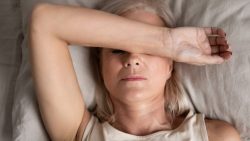Menopause and Sleep Apnea – How Are They Connected?
May 1, 2021
Menopause comes with a laundry list of unwelcome potential symptoms. Why? Because a woman’s body is going through some dramatic, once-in-a-lifetime hormonal changes. While some consequences of menopause, such as irregular menstruation, hot flashes, and mood changes, are well-known, there are others that do not get the attention they deserve. Most people do not know that menopause can worsen or even lead to obstructive sleep apnea. Let’s talk about the mostly unknown connection between these two conditions.
Menopause as a Risk Factor for Sleep Apnea
Estrogen and progesterone play a number of important roles in a woman’s body, one of which is to help maintain muscle tone in the throat. Without an adequate supply of these hormones to keep a woman’s airway toned and free of obstructions, she is at a greater risk of developing obstructive sleep apnea (OSA).
Weight gain is common during menopause, and a woman’s body fat may even be redistributed. What does this mean? It means that she may gain more fat around her neck, increasing its size. A large neck circumference is another significant factor that contributes to sleep apnea.
Hot Flashes and Sleep Apnea
Close to 80 percent of middle-age women experience hot flashes and night sweats. Recent research indicates that these issues may lead to a significantly increased risk of sleep apnea. The relationship between severe hot flashes and OSA may not be one of cause and effect. Rather, both conditions may be due to underlying health issues. However, doctors may still find it beneficial to consider severe menopause symptoms as a possible indicator of sleep apnea.
The same study that connected hot flashes to sleep apnea also found that many of the women who were deemed to be at risk for OSA had still not been diagnosed with it two years after the initial research. That isn’t necessarily because they were free of OSA—rather, it may be because women often experience different OSA symptoms than men, which makes it difficult for doctors to form an accurate diagnosis. For example, women do not always snore loudly, and loud snoring is one of the key indicators that doctors use to recognize and diagnose OSA.
Thus, it is important for menopausal women who believe they have sleep apnea to be aware of other indicators of the condition, such as restless nights, insomnia, frequent nighttime urination, and excessive daytime drowsiness. They should tell their doctor about such symptoms and perhaps even request a sleep test.
Are you going through menopause and finding it difficult to get the rest you need? Talk to your doctor about the possibility that you may have obstructive sleep apnea. After proper testing and diagnosis, you will be able to receive the treatment you need in order to sleep better each night and wake up refreshed.
About the Author
Dr. Kenneth Mogell, a board-certified specialist in sleep medicine with over 10 years of experience treating sleep breathing disorders is the practice’s founder and primary practitioner. The practice has four South Florida locations: Boca Raton, Melbourne, Vero Beach, and Jupiter. To learn more about Florida Dental Sleep Disorders and Dr. Kenneth Mogell, contact our team at 844-294-7559.
